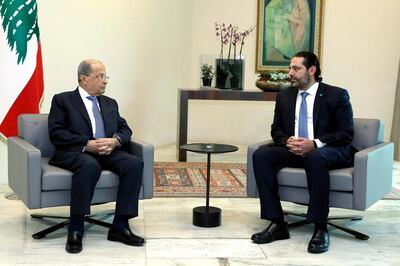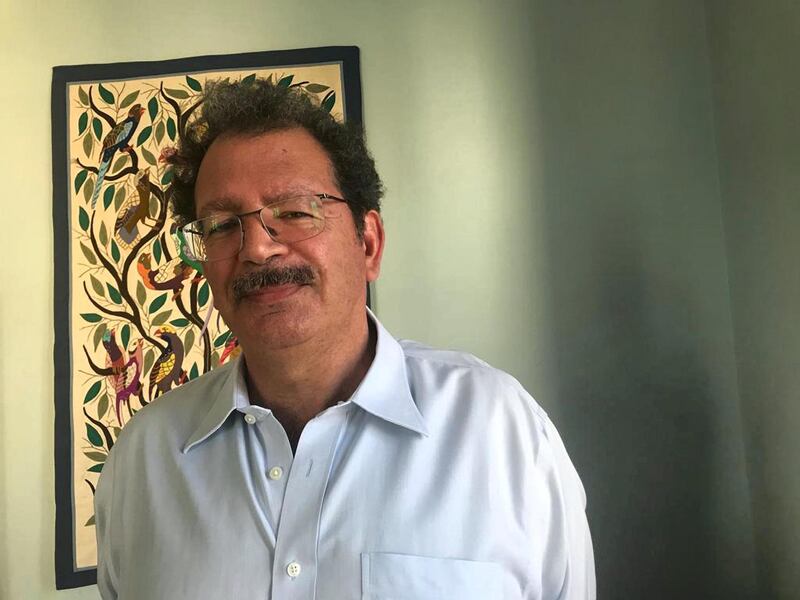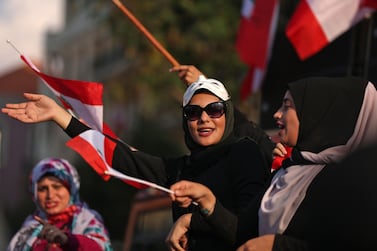Lebanon’s political upheaval could be contained if a civil government representing the protest movement takes over in exchange for the Hezbollah-backed president remaining in power, according to Lebanese constitutional expert Chibli Mallat.
Mr Mallat, the author of several works on Middle East law and nonviolent political change, told The National that Prime Minister Saad Hariri had made a grave error by not resigning as demanded by protesters.
The prime minister made it clear on Monday that he would stay in office after his coalition Cabinet met his 72-hour ultimatum to approve a package of economic reforms that no government in the past 29 years has managed to implement.
Mr Hariri returned to power earlier this year as a result of a deal that increased the influence of Hezbollah over state organisations and foreign policy. But with the country facing its worst economic crisis since the civil war ended in 1990, even supporters of the powerful Shiite group have joined the calls for the toppling of Lebanon’s entire political class.
Mr Mallat said Mr Hariri had greatly damaged himself by standing aside as “Hezbollah dictated a shift of our government to an increasingly Iranian and Syrian [regime] agenda”.
Key to this shift has been Foreign Minister Gebran Bassil, for whom the demonstrators have reserved their severest abuse.
“Hariri did not resign at the end of the 72 hours that he suggested. We can be sure that the street will attack him in a very demeaning way like Mr Bassil,” Mr Mallat said.
“His second mistake of course is the economic collapse that his inactivity and the corruption that had continued under his rule have brought.”

Mr Mallat said the protest movement’s current lack of leadership was not detrimental.
“The advantage to that problem is that there is no easy target for the counterrevolution. The disadvantage of course is that you need a unifying voice. I think there are quite a lot of burgeoning leaderships,” he said.
He said the mass participation of youth and women in the protests should be reflected in a new government where half the ministers were under 30 and half of the portfolios went to women.
“It would be a signal of the success of the revolution,” said the 59-year-old law professor, who taught at Harvard and Princeton and ran for president after the Cedar Revolution of 2005. Mr Mallat organised protests in 2016 over the post remaining vacant because of political deadlock.
Mr Mallat warned against relying on the term “technocratic” to make superficial cabinet changes that would end up not meeting the aspirations of the demonstrators.
“I don’t like this word. The cabinet would be political in the sense that it would be comprised of people who want to manage the country properly and cleanly. This does not mean they are not political. They are just not from party lines,” he said.
“The street is making very clear its desire to see altogether new faces that represent them.”
However Hezbollah, the only non-state actor in Lebanon officially allowed to hold arms, hinted that it would deploy in the streets if the protesters marched to remove President Michel Aoun, its main Christian ally, whose son-in-law is Mr Bassil.
Mr Mallat said the protest movement’s cross-sectarian goals and its striving for equality before the law have contributed to its mass appeal, and made it more difficult for the demonstrations to be put down by force.
But the demonstrators will need to take practical steps to outmanoeuvre those seeking to maintain the status quo and to avoid a counterrevolution similar to those that crushed some of the 2011 Arab uprisings.
Mr Mallat dismissed argument by some of the current ministers that the departure of Mr Hariri, Lebanon’s best connected politician on the international scene, would create a costly void.
“Every single citizen demonstrating on the street today is better than our president or prime minister, or almost any minister or deputy,” he said.
President Aoun, a former general now in his 80s, made his first comments on the protests on Monday, saying the people were expressing their pain on the streets.
“Mr Aoun should support a civil government and rely on it and enjoy the rest of his presidency,” Mr Mallat said. “But my fear unfortunately is that he will not and we may see very difficult days ahead.”







